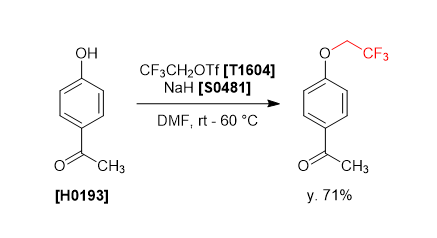Make sure to sign up for an account today for exclusive coupons and free shipping on orders over $75!
Maximum quantity allowed is 999
CAS RN: 6226-25-1 | Product Number: T1604
2,2,2-Trifluoroethyl Trifluoromethanesulfonate

Purity: >97.0%(GC)
- 2,2,2-Trifluoroethyl Triflate
- Trifluoromethanesulfonic Acid 2,2,2-Trifluoroethyl Ester
| Size | Unit Price | Philadelphia, PA | Portland, OR | Japan* | Quantity |
|---|---|---|---|---|---|
| 5G |
$142.00
|
1 | 2 | 16 |
|
| 25G |
$354.00
|
1 | 1 | ≥60 |
|
* Items in stock locally ship in 1-2 business days. Items from Japan stock are able to ship from a US warehouse within 2 weeks. Please contact TCI for lead times on items not in stock. Excludes regulated items and items that ship on ice.
* To send your quote request for bulk quantities, please click on the "Request Quote" button. Please note that we cannot offer bulk quantities for some products.
*TCI frequently reviews storage conditions to optimize them. Please note that the latest information on the storage temperature for the products is described on our website.
| Product Number | T1604 |
| Purity / Analysis Method | >97.0%(GC) |
| Molecular Formula / Molecular Weight | C__3H__2F__6O__3S = 232.10 |
| Physical State (20 deg.C) | Liquid |
| Storage Temperature | Room Temperature (Recommended in a cool and dark place, <15°C) |
| Store Under Inert Gas | Store under inert gas |
| Condition to Avoid | Moisture Sensitive |
| CAS RN | 6226-25-1 |
| Reaxys Registry Number | 2051235 |
| PubChem Substance ID | 87577361 |
| MDL Number | MFCD00671579 |
| Appearance | Colorless to Light yellow clear liquid |
| Purity(GC) | min. 97.0 % |
| NMR | confirm to structure |
| Boiling Point | 91 °C |
| Flash point | 16 °C |
| Specific Gravity (20/20) | 1.61 |
| Refractive Index | 1.31 |
| Pictogram |




|
| Signal Word | Danger |
| Hazard Statements | H332 : Harmful if inhaled. H314 : Causes severe skin burns and eye damage. H341 : Suspected of causing genetic defects. H225 : Highly flammable liquid and vapor. |
| Precautionary Statements | P501 : Dispose of contents/ container to an approved waste disposal plant. P261 : Avoid breathing dust/ fume/ gas/ mist/ vapors/ spray. P202 : Do not handle until all safety precautions have been read and understood. P240 : Ground/bond container and receiving equipment. P210 : Keep away from heat/sparks/open flames/hot surfaces. No smoking. P233 : Keep container tightly closed. P201 : Obtain special instructions before use. P243 : Take precautionary measures against static discharge. P241 : Use explosion-proof electrical/ ventilating/ lighting/ equipment. P242 : Use only non-sparking tools. P271 : Use only outdoors or in a well-ventilated area. P264 : Wash skin thoroughly after handling. P280 : Wear protective gloves/ protective clothing/ eye protection/ face protection. P370 + P378 : In case of fire: Use dry sand, dry chemical or alcohol-resistant foam to extinguish. P308 + P313 : IF exposed or concerned: Get medical advice/ attention. P303 + P361 + P353 : IF ON SKIN (or hair): Take off immediately all contaminated clothing. Rinse skin with water/shower. P301 + P330 + P331 : IF SWALLOWED: Rinse mouth. Do NOT induce vomiting. P363 : Wash contaminated clothing before reuse. P304 + P340 + P310 : IF INHALED: Remove person to fresh air and keep comfortable for breathing. Immediately call a POISON CENTER/doctor. P305 + P351 + P338 + P310 : IF IN EYES: Rinse cautiously with water for several minutes. Remove contact lenses, if present and easy to do. Continue rinsing. Immediately call a POISON CENTER/doctor. P403 + P235 : Store in a well-ventilated place. Keep cool. P405 : Store locked up. |
| RTECS# | PB2775000 |
| UN Number (DOT-AIR) | UN2920 |
| Class (DOT-AIR) | 8/3 |
| Packing Group (TCI-A) | II |
| HS Number | 2905.29.9000 |

-
Used Chemicals
-
Procedure
-
To a solution of 4'-hydroxyacetophenone (1.0 g, 7.34 mmol) in DMF (10 mL) was slowly added sodium hydride (353 mg, 8.38 mmol) at rt and the mixture was stirred for 10 min. CF3CH2OTf (1.27 mL, 8.38 mmol) was added to the reaction mixture and stirred overnight at 60 °C. The reaction mixture was diluted with ethyl acetate (100 mL) and washed with water (50 mL) and brine (50 mL), then the organic layer was dried over sodium sulfate and filtered. The solvent was removed under reduced pressure and the residue was purified by column chromatography (on silica gel, ethyl acetate:hexane = 0:1 - 15:85) to give 4-(2,2,2-trifluoroethoxy)acetophenone as a pale yellow solid (1.2 g, 71%).
-
Experimenter’s Comments
-
The reaction mixture was monitored by UPLC.
-
Analytical Data
-
4-(2,2,2-trifluoroethoxy)acetophenone
1H NMR (270 MHz, CDCl3); δ 7.98 (d, 2H, J = 8.9 Hz), 6.99 (d, 2H, J = 8.9 Hz), 4.43 (q, 2H, J = 8.1 Hz), 2.59 (s, 3H).
-
Lead Reference
-
- Synthesis and Evaluation of Antiplasmodial Activity of 2,2,2-Trifluoroethoxychalcones and 2-Fluoroethoxy Chalcones against Plasmodium falciparum in Culture

References
- 2,2-difluoro-1-tosyloxyvinyllithium: a novel, effective reagent for the preparation of α-keto acids from carbonyl compounds
- A one-pot synthesis of 2,2-difluorovinyl carbonyl compounds from 2,2,2,-trifluoroethyl p-toluenesulfonate via 2,2-difluorovinylboranes

References
- A convenient preparation of arylthioynamines
- New applications of organofluorine reagents in organic synthesis. III. A convenient synthetic method for acetylenic ethers and thioethers
- Synthesis of 2,2,2-trifluoroethanesulfonic acid
References
- Synthesis of fluorine-containing amino acids
- Reaction with phenols
Articles/Brochures
Safety Data Sheet (SDS)
The requested SDS is not available.
Please Contact Us for more information.
Specifications
C of A & Other Certificates
Sample C of A
A sample C of A for this product is not available at this time.
Analytical Charts
The requested analytical chart is not available. Sorry for the inconvenience.





